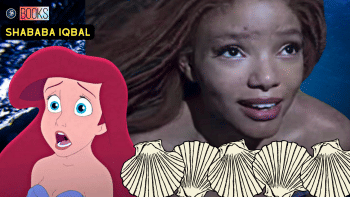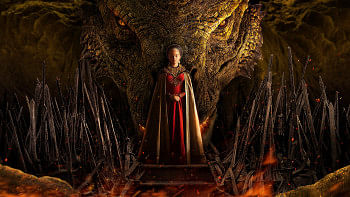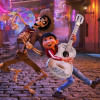Mermaids aren’t real, and neither is race

A recent tweet explained the often-elusive difference between science fiction and fantasy: "Fantasy is when Black people are told they're historically inaccurate, sci-fi is when Black people are told 'it's woke garbage' they exist."
The concept of race in speculative fiction comes up in media discourse whenever someone in some well-known media franchise turns up with a crumb of melanin. It is a debate that is particularly frustrating, because like most issues of the 21st century, it requires an exhausting amount of nuance and analysis while simultaneously being incredibly stupid.
We've had Black stormtroopers (Star Wars, not the Sturmabteilung, though there is that one Key & Peele sketch), who apparently couldn't exist because of (a worryingly racist reason). The casting of people of colour in Netflix's adaptation of The Witcher was derided because of (a worryingly racist reason). Black women cannot exterminate ghosts because of (a worryingly racist reason). And over the past few months, it's been Black elves, Black dwarves, Black Targaryens, and now Black mermaids can't exist because of (you get the idea).
Why not a Black mermaid? Because Hans Christian Andersen was a White guy? Disney, a multibillion-dollar corporation with a vice grip on global entertainment, is not making a loving homage to 19th century Danish culture. (Nor, I suspect, are people who are mad about Black mermaids particularly interested in 19th century Danish culture or the sanctity of Andersen's body of work.) Disney has no in-text reason to not cast people of colour in whatever role. We are at a point in our history, thankfully, where denying roles to actors of colour is recognised as racial discrimination. Meanwhile, House of the Dragon's prominent change of characters to black and mixed race is not merely colourblind, but in fact adds to the plot. The show still largely has a White cast, but its decision to show the existence of racial diversity in Fantasy Europe has been treated as "historically inaccurate."
There is a point to this: Westeros is not real, but it does represent a vision of Europe, and so we can expect the people within its world to look European. Of course, if you look at Europe, you'll find Bangladeshis running gulyás éttermek in Budapest, even though Viktor Orban told me Hungary is for white people. But historically, right?
Black and Brown people are "historically accurate" to any fantastical rendering of Europe. The imagination of medieval Europe that serves as the template for your bog-standard fantasy setting is White, because Europe has historically been imagined to be White, as a project to imagine the presence of supposedly non-White bodies as interlopers, outsiders, people who do not belong. Even if the faulty imagination of a "White Europe" were true (it is, to reiterate, not true), the modern Western world that generates the bulk of our entertainment is demonstrably not a White world, and to insist on a performance of Whiteness in the media where the diversity underlying the real world is erased cannot be justified except by (a worryingly racist reason).

Let's go deeper. Are elves, Targaryens and mermaids White? No. Because elves, Targaryens, mermaids and White people don't exist in the real world.
Race itself is not real. Race is the idea that humanity can be sorted into discrete groups with unique behavioural and intellectual characteristics, largely corresponding with physiological differences and similarities between potentially related groups of people. The ways in which these physical characteristics dictate identity and culture are fantasies, and our current conceptualisation of race derives heavily from the last couple centuries of European imperialism, and from the dominance of American media. Race is one of the most important concepts underlying modern social relations while simultaneously completely fictional.
This means that while there are no mermaids in real life, the skin tone we ascribe to the mermaid's human half is a legitimate battleground for how we view race. Speculative fiction has long held what Helen Young called "Habits of Whiteness." We live in a world that continues to be dominated by a former imperial core, whose self-declared rightful inhabitants in turn self-declared as "White," and their viewpoint continues to dictate the shape of the world through global culture. It is a viewpoint that centralises Whiteness as the normal. Speculative fiction has its roots in genre conventions established by writers who hailed from an era of explicit imperialism (rather than the more genteel liberal capitalism of today). JRR Tolkien, we can very safely say, never imagined the existence of a Black elf. He was a White supremacist. Though he was no Lovecraft, who wrote primarily to express race anxiety, race as hierarchy is intrinsic to Tolkien's worldbuilding.
Let's circle back. As elves aren't real, they can be Black. In the context of a Tolkien adaptation, however, skin colour matters. The canonical Whiteness of elves isn't just the default assumption of a writer imagining Ye Olde England as a supermarket mayonnaise aisle. It is thematically consistent with Tolkien's view of racial hierarchy. In Tolkien's legendarium, elves are White for a reason: because he wanted to represent a superior form of life. What elves are to the Men of Numenor (the Men of the West), Numenoreans are to the other categories of men, and then on down to the orcs et al. Sentient life is sorted into racial categories of greater and lesser worth. The parallels are not coincidental. Tolkien famously despised allegory, but everyone writes an allegory whether they want to or not. Just as racial hierarchy was not incidental to the world in which Tolkien lived, it was not incidental to the world he invented.
Should a Tolkien elf only be played by a White actor? No. However, a better show than The Rings of Power might have had something insightful to say about race through the casting of Black actors in roles that were, in the original, expressions of White supremacist race hierarchy. Instead, The Rings of Power represents yet another sort of fantasy: a world where anyone anywhere can look like anything, and you don't need to think about it too much. This sort of fantasy of diversity would certainly feel less cynical if it were not being beamed at us by Amazon.
The fantasy of racial diversity that Amazon and Disney relay relies on a lack of history, where we have no politics or opinions that trouble a society making money for our bosses. Race is a fiction, but its pages are burnt and bloody. Race matters. The politics of the representation of this fantasy in fields of make-believe are not clear-cut, the stories we appear in are often written with the subtext of our exclusion, and our increasing presence on the screen (rather than just consuming content) cannot be to passively legitimise anodyne projects of racist capitalism.
Zoheb Mashiur is a doctoral researcher on racial discourse and colonial history, based at the University of Kent.

 For all latest news, follow The Daily Star's Google News channel.
For all latest news, follow The Daily Star's Google News channel. 









Comments